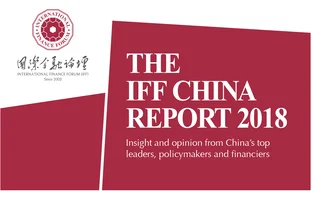
Enhancing the role of finance in supporting the real economy
Sun Yiting, director of the China Sustainable Finance Project of the World Wide Fund for Nature, discusses the static role of finance in supporting the real economy, and identifies five ways of broadening its influence


The report of the 19th National Congress of the Communist Party of China proposed to deepen financial reform and strengthen the role of finance in supporting the real economy, which is a clear direction for the market economy under socialism with Chinese characteristics in the ‘new era’ of Chinese politics and power. Measures to cut costs, released by the National Development and Reform Commission, alongside three ministries and the Implementation plan for establishment of inclusive financial business divisions by medium and large-sized commercial banks, co-released by eleven ministries, all emphasise the major problem of finance lacking the strength to support the real economy. To address this issue, the following five fundamental problems must be resolved:
Types of projects that need support
Financial projects can be divided into three categories: mature and market-oriented projects, which can easily acquire bank loans; projects in the public interest, which are highly external and depend entirely on public capital and finance; and projects that lie between projects that have both public and private benefits, which are the focus of this article.
Four types of project deserve financial support: projects with advanced and world-leading technology; innovative projects; projects of huge influence on social and economic development; and distinctive projects that can promote local diversity. In this sense, a list of real economies that require financial support should be compiled, so banks can act accordingly. Only with a full picture of the entire industry and an understanding of clearly defined goals can appropriate financial and policy support be provided.

Encourage innovation and entrepreneurship
The development of the real economy requires financial support, but this is neither an effort towards poverty reduction nor public welfare. Factors such as commerciality, risk management, technology, business models and market prospects must all be taken into consideration. China’s bicycle-sharing system, for example, is highly competitive, yet requires little technology. Comprehensive risk assessment is recommended before financial support is offered in this industry. The government has granted tax incentives and subsidies to many enterprises. However, these preferential treatments are used to improve balance sheets and increase cashflow, rather than capital operation, technological innovation and long-term planning. To continuously increase the ability of financial services in supporting the real economy, we need to encourage innovation and entrepreneurship.
Expand financing channels
For a long time, China’s real economy had no access to financing, and its banking systems still have many limitations and difficulties. Different financing channels should be chosen according to the progress and characteristics of various projects. For projects in their early stages, angel funds and venture capital should be considered. In the 20th century, many industries in the US relied on private capital to achieve solid growth. In subsequent stages, private equity funds and bank loans can be turned to for further financing. Once projects have reached certain maturity, capital market tools such as bond and equity financing can be adopted. This way, different projects can have suitable investment and financing channels. To solve the problem of financing, we must also increase the number of small and medium-sized financial institutions. Large and medium-sized banks, small banks and even smaller micro-banks are all required to provide financial services to different industries and regions. To provide more help for the real economy, foreign financial institutions are welcomed to invest in shares in the Chinese market.
Ensure financial support to the real economy through carefully undertaking appropriate groundwork
Groundwork must be undertaken in four key areas. The first is information management and big data analysis. The second is the establishment of individual, business and government credit systems – government credit refers to the ability to borrow and issue debts, as well as the responsibility for commitments. In the current context, the credit system is of crucial importance in utilising finance to support the real economy. Third, the relevant legal system should be improved. Fourth, patent mechanisms should be established to encourage innovation and entrepreneurship – this is essential for innovation and the future of industries.
Give full access to market mechanisms and clarify the roles of government and market in the real economy
The government has two responsibilities. First, rules and red lines should be established for the real economy to ensure it operates within an appropriate range. Second, necessary financial and tax measures should be taken to support the real economy, and a prosperous investment and business environment must be created. Also, financial institutions need to conform with the law of the market, and all achievable governmental policies should be implemented.
Only users who have a paid subscription or are part of a corporate subscription are able to print or copy content.
To access these options, along with all other subscription benefits, please contact info@centralbanking.com or view our subscription options here: www.centralbanking.com/subscriptions
You are currently unable to print this content. Please contact info@centralbanking.com to find out more.
You are currently unable to copy this content. Please contact info@centralbanking.com to find out more.
Copyright Infopro Digital Limited. All rights reserved.
As outlined in our terms and conditions, https://www.infopro-digital.com/terms-and-conditions/subscriptions/ (point 2.4), printing is limited to a single copy.
If you would like to purchase additional rights please email info@centralbanking.com
Copyright Infopro Digital Limited. All rights reserved.
You may share this content using our article tools. As outlined in our terms and conditions, https://www.infopro-digital.com/terms-and-conditions/subscriptions/ (clause 2.4), an Authorised User may only make one copy of the materials for their own personal use. You must also comply with the restrictions in clause 2.5.
If you would like to purchase additional rights please email info@centralbanking.com







